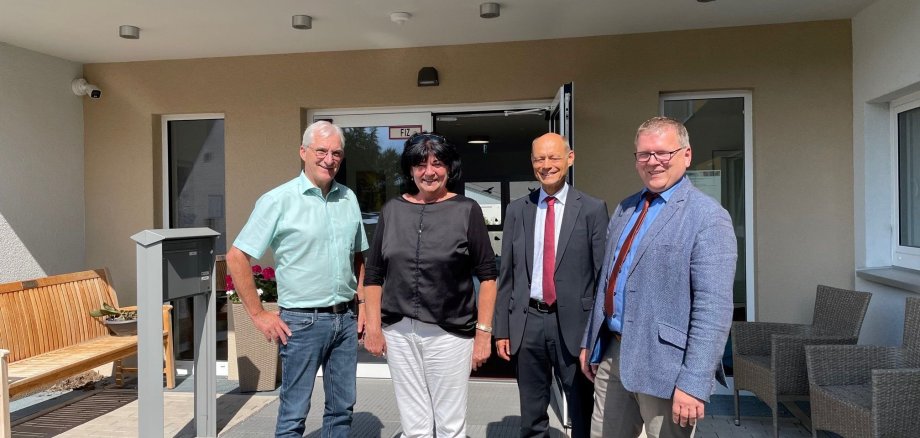District and DIAKO master geriatric care together
In June 2022, DIAKO Waldeck-Frankenberg gGmbH opened another senior care facility in the Waldeck-Frankenberg district, the "Lisa Bergmann Haus" in Diemelsee-Adorf. In the facility, 48 residents are cared for in a very professional and empathetic manner by the team headed by home manager Gabriele Walther. First District Councillor and Head of Social Affairs Karl-Friedrich Frese was able to see this for himself during a visit together with the two managing directors of the DIAKO, Oswald Beuthert and Stefan Kiefer.
The visit also provided an opportunity for an exchange on current issues of care and assistance for the elderly. Here the facilities, which today belong to the DIAKO, and the district have been working closely together for decades. Frese reported on a dramatic increase in benefits for help with care, caused by the certainly justified income development of care staff, the legally introduced tariff loyalty and the significantly higher expenses, e.g. for heating and food. This leads to more and more people being dependent on social benefits because their pensions are significantly lower than the costs of nursing home care. For the district, the expenses had increased from 2.5 million euros over many years to more than 5 million euros in 2022. In the current year, the district expects to spend about 7.2 million euros.
On the other hand, the demographic development towards more and more elderly people, some of whom are in need of care, is increasing the need for qualified inpatient care for the elderly, emphasised Pastor Beuthert. This poses new challenges for the facilities because, for cost reasons, people come to the facilities very late and then with a high need for care. Nursing homes for the elderly are thus developing more and more in the direction of hospices.
There are also quite worrying developments in outpatient care due to the sharp rise in costs. People in need of help are allocated a monthly budget for outpatient services by the health insurance funds, which, however, is often not sufficient for urgently needed assistance. The state of health deteriorates, early admission to inpatient facilities of people in need of care is the result.
Frese and the DIAKO representatives Beuthert and Kiefer agree: legislators as well as health and long-term care insurance funds are urgently required to face the new challenges in elderly care and to find solutions as well as new financing mechanisms. At present, they say, the development is being shifted onto the backs of those in need of care and the municipal budgets. "Therefore, the major topic of `care' will also be the focus of the first district health conference, which we are currently preparing in the district administration for the beginning of 2024," said the head of social affairs. This forum will also look at the direction of care for the elderly in the future with new offers.
One such offer as a future model for rural areas could be mixed-use building complexes in all those towns and communities in the district where there is still an adequate basic supply with shopping facilities, medical care, local public transport and leisure facilities. There, assisted and/or elderly-friendly housing should be established in the vicinity of social or privately financed housing. The aim is for people to support each other across generations or through local self-help. Health centres and public and private services could be integrated. Frese concludes: "The district will look for places where a pilot project for such a building complex can be realised.
